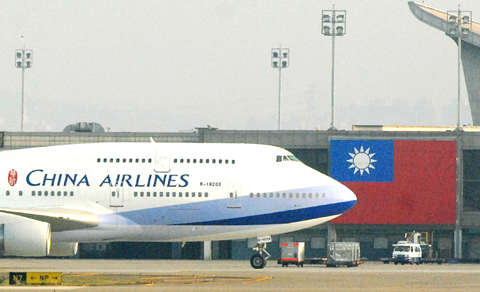Taiwan-based China Airlines (華航), which marks its 50th birthday this week, can look back at half a century of turbulence, but the future could bring even more formidable challenges, analysts said.
While in the past an abysmal safety record was the main problem, now the carrier faces completely different threats from China’s aggressive state-controlled airlines and the region’s nimble low-cost carriers.
“It’s a company that has come through years of external shocks and storms probably shaken, but still fighting,” said Derek Sadubin, an analyst with the Center for Asia Pacific Aviation, a Sydney-based consultancy. “They’ve got the support of the Taiwan government behind them, which has given them a degree of confidence, but it’s an airline that really needs to step up a gear to face the challenges ahead.”

PHOTO: PATRICK LIN, AFP
Starting out on Dec. 16, 1959 with just two World War II-era flying boats, China Airlines has grown into an international carrier with a fleet of 66 modern aircraft.
What has also grown with the company, which is 54 percent owned by a state fund, is a record of spectacular crashes that have made it one of the riskiest carriers in Asia.
Among the more recent, in May 2002 a Boeing 747 smashed into the Taiwan Straits, killing all 225 people on board. Five years later, a Boeing 737 burst into flames while landing in Okinawa, although without fatalities.
A propensity for risk-taking among the carrier’s pilots, who for decades were recruited mainly from the island’s air force, has often been pinpointed as a liability.
“Their staff are more like government employees than their counterparts in other companies,” said Bruce Tsao, a Taipei-based analyst with Capital Securities (群益證券). “It’s an old company with a government background. That mentality may be related to its safety track record.”
The carrier’s reputation for poor safety has forced it to take a series of steps aimed at renewal “from inside out,” said Debbie Wu (吳宜蓁), a public relations expert at Fu-Jen Catholic University in Taipei.
“This ranges from organizational reconstruction to buying new jets and designing new uniforms, and the consumers have noticed the changes,” she said. “The public is forgetful, and the airline has diverted attention from the negative news by creating new topics with these moves. It has successfully turned its image around.”
But one thing has not changed: the company’s name, which dates from a time when Taiwan’s leaders, refugees from communist-controlled China, still claimed to represent all of the country.
China Airlines may in fact be a more apt name now than it has been for a long time because of the enormous opportunities associated with the booming China market.
A thaw in relations between China and Taiwan means the carrier now operates 55 weekly flights to 13 cities in China.
While it faces competitors from both Taiwan and China, the China routes are a sure earner because of rules that exclude foreign airlines.
“Basically, most players in this market are winners,” said Francis Hsiao (蕭義展), a Taipei-based analyst with Grand Cathay Securities (大華證券).

MULTIFACETED: A task force has analyzed possible scenarios and created responses to assist domestic industries in dealing with US tariffs, the economics minister said The Executive Yuan is tomorrow to announce countermeasures to US President Donald Trump’s planned reciprocal tariffs, although the details of the plan would not be made public until Monday next week, Minister of Economic Affairs J.W. Kuo (郭智輝) said yesterday. The Cabinet established an economic and trade task force in November last year to deal with US trade and tariff related issues, Kuo told reporters outside the legislature in Taipei. The task force has been analyzing and evaluating all kinds of scenarios to identify suitable responses and determine how best to assist domestic industries in managing the effects of Trump’s tariffs, he

TIGHT-LIPPED: UMC said it had no merger plans at the moment, after Nikkei Asia reported that the firm and GlobalFoundries were considering restarting merger talks United Microelectronics Corp (UMC, 聯電), the world’s No. 4 contract chipmaker, yesterday launched a new US$5 billion 12-inch chip factory in Singapore as part of its latest effort to diversify its manufacturing footprint amid growing geopolitical risks. The new factory, adjacent to UMC’s existing Singapore fab in the Pasir Res Wafer Fab Park, is scheduled to enter volume production next year, utilizing mature 22-nanometer and 28-nanometer process technologies, UMC said in a statement. The company plans to invest US$5 billion during the first phase of the new fab, which would have an installed capacity of 30,000 12-inch wafers per month, it said. The

Taiwan’s official purchasing managers’ index (PMI) last month rose 0.2 percentage points to 54.2, in a second consecutive month of expansion, thanks to front-loading demand intended to avoid potential US tariff hikes, the Chung-Hua Institution for Economic Research (CIER, 中華經濟研究院) said yesterday. While short-term demand appeared robust, uncertainties rose due to US President Donald Trump’s unpredictable trade policy, CIER president Lien Hsien-ming (連賢明) told a news conference in Taipei. Taiwan’s economy this year would be characterized by high-level fluctuations and the volatility would be wilder than most expect, Lien said Demand for electronics, particularly semiconductors, continues to benefit from US technology giants’ effort

‘SWASTICAR’: Tesla CEO Elon Musk’s close association with Donald Trump has prompted opponents to brand him a ‘Nazi’ and resulted in a dramatic drop in sales Demonstrators descended on Tesla Inc dealerships across the US, and in Europe and Canada on Saturday to protest company chief Elon Musk, who has amassed extraordinary power as a top adviser to US President Donald Trump. Waving signs with messages such as “Musk is stealing our money” and “Reclaim our country,” the protests largely took place peacefully following fiery episodes of vandalism on Tesla vehicles, dealerships and other facilities in recent weeks that US officials have denounced as terrorism. Hundreds rallied on Saturday outside the Tesla dealership in Manhattan. Some blasted Musk, the world’s richest man, while others demanded the shuttering of his